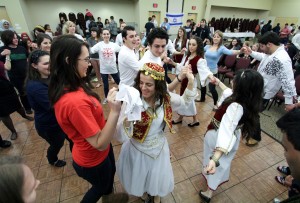

The clock read 7 a.m. as Iffa Kazi (’13 B.A.) startled herself awake to the sound of her alarm.
The sun had yet to rise and Kazi, a University of Michigan-Dearborn senior at the time, began to question why she signed up to volunteer on her day off.
“You know it’s for a great cause, so you just have to give yourself that pep talk to drive yourself out of bed,” she said.
Kazi eventually rolled out of bed, grabbed her coffee and drove to UM-Dearborn to participate in Martin Luther King Jr. Day of Service.
As she entered the University Center, it hit her.
“There’s like an excitement in the air,” she said. “You can tell that everyone’s exhausted, but then you see all your friends and classmates on their day off. It’s like this infectious excited feeling. Even though you’re exhausted, you become pumped to be there and to join in this experience.”
She recognized friends from the Jewish Student Organization, Black Student Union and Muslim Student Association. It’s that sense of inclusion that prompted Kazi to establish UM-Dearborn’s Association for Diversity and Unity.
“Regardless of whether you perceive yourself as a minority or not, you’ll find a group of people that you can identify with, whether it’s through your ethnicity or your religion, your major or some random obscure hobby,” she said. “I think that’s the best part about UM-Dearborn.”
Diversity is engrained in the university’s DNA. UM-Dearborn embraces diversity on a daily basis through its interaction and inclusive dialogue.
And inclusion is even more important at UM-Dearborn because of its location in southeast Michigan. The region brings with it plenty of diversity, something the university welcomes with open arms.
The ultimate goal is to create an open environment for people of all backgrounds. The campus community is well on its way.
A Top Priority
Anthony Wagner didn’t know what to expect when he enrolled at UM-Dearborn.
Wagner grew up in Dearborn, so his journey to the university seemed like a foregone conclusion. Though he had no idea how much inclusion impacted student lifeHeHeHe had no idea.
“We have the diversity part down–it’s just natural,” he said. “Inclusion is different. Inclusion means making sure people feel welcome. I make sure I’m interacting with everybody. I make sure all students have the same access to our resources.”
Wagner works to maintain that inclusive environment through his involvement in various student organizations, including Student Government and the Gender and Sexuality Alliance.
He is one of many students who push for inclusion, but said UM-Dearborn’s administration drives that mission.
It all starts with Chancellor Daniel Little. It’s not very often that Little delivers a speech that doesn’t touch on inclusion. For Little, inclusion is a priority.
“Inclusion is about more than diversity and mutual respect,” he said. “It’s about creating a learning and working environment in which everyone can learn from each other and form social connections across the many lines of difference our society presents us with. I hope UM-Dearborn can be seen as a national model of a campus that has figured out how to create an open and inclusive environment for people of all races, religions and social classes.”
Creating a Dialogue
A high school student approached a microphone stand in UM-Dearborn’s Kochoff Hall.
He then asked panelists why African Americans often are referred to as “blacks” on TV and in newspapers.
Addell Anderson, director of the U-M Detroit Center, responded by telling him that “black is a powerful color.”
That’s just one example of the positive dialogue that stems from “A Conversation on Race,” the university’s ongoing series designed to promote open and honest discussion about racial issues. Notable speakers visit UM-Dearborn throughout the year to discuss race and its impact on society.
Events like “A Conversation on Race” help promote inclusion.
Hanan Hashem agrees, and that’s why the UM-Dearborn senior established the Organization for Interfaith Coexistence on campus. The organization strives to promote interfaith dialogue, encourage social service among people of different religious backgrounds and spread awareness of different religions on campus.
“We thought everybody needs something like this,” she said.
An Inclusive Future
Umesh Rohatgi (’82 M.S.E.) lived in India when he decided to pursue a master’s degree.
That pursuit prompted Rohatgi to leave his native country and head to UM-Dearborn. Moving to a foreign country can be difficult, but Rohatgi said the university made his transition much smoother.
“For me, there were no problems,” he said.
Rohatgi interacted with his classmates, no matter their background. That was the type of environment at UM-Dearborn, then and now, he said.
“I really love to talk to people of different backgrounds,” he said. “Breaking the ice plays a big role in inclusion. Don’t just sit with your own people. Sit with others, so you can understand them better. Once you do, you’ll see your needs and requirements are quite similar.”
Rohatgi retired from Ford Motor Co. as an engineer, and now devotes his life to social work. He works with area homeless and provides them blankets, clothing and food. Rohatgi also offers assistance to metropolitan Detroit residents who seek help paying their utility bills.
His generosity doesn’t favor a particular race, sexuality, religion or social class.
“I don’t help an Arab because he’s Arab,” he said. “I help him because he’s a human being.”




